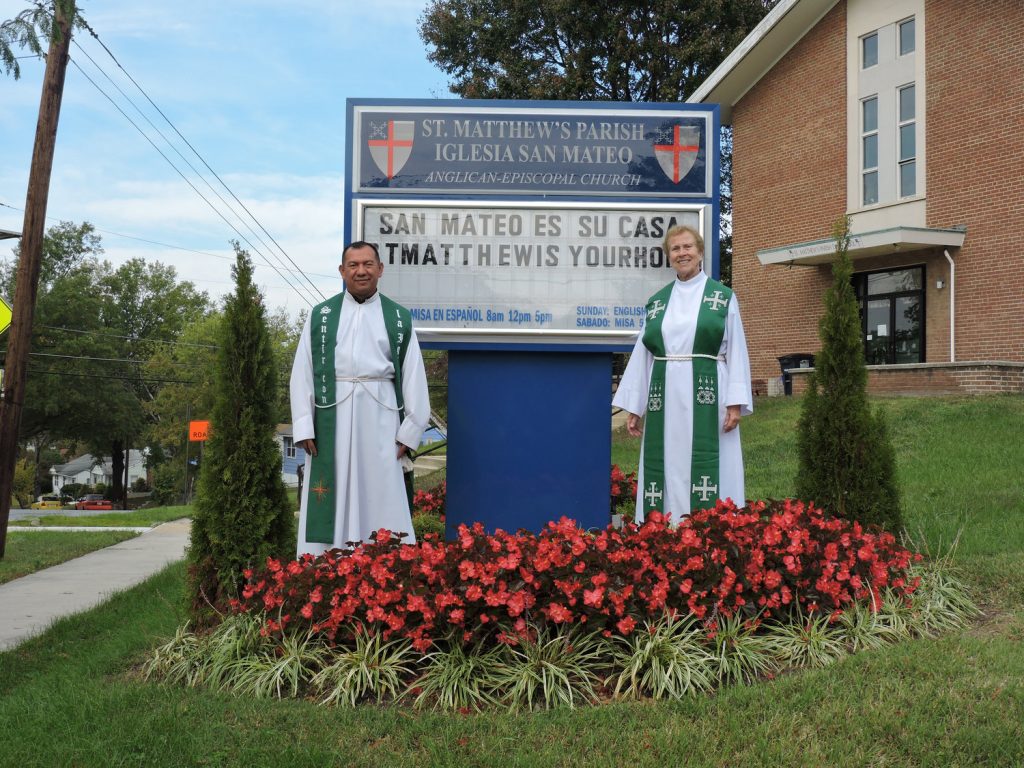Forty percent of the 800-member congregation of St. Matthew’s Parish in Hyattsville, Md., are Salvadorans with Temporary Protected Status (TPS). The Episcopal church is responding to the Trump administration’s deportation threats pastorally, but also politically, and they’re not the only ones. Religion News Service has published a story on the reality St. Matthew’s parishioners and priest are facing, and how parishes are responding to and working against the threat:
“On Sunday I will preach to the community that this is a sad reality — it’s a disgrace on the part of the U.S. government. It’s absurd, dehumanizing, unconscionable, un-Christian,” the Rev. Vidal Rivas, who is also Salvadoran, told RNS last week.
Rivas spoke in Spanish while standing next to a statue of Oscar Romero — the revered Salvadoran martyr now in line for sainthood in the Catholic Church — that adorns the front of his sanctuary.
Trump, Rivas added, “has to understand that laws are not made to abuse the poor, rather to favor the poor. But in fact he is favoring the wealthy, which is an insult to God’s people.”
Ana Langerak, the church’s associate priest, said the congregation has been preparing for the potential end of TPS status for months, with some worshippers tearfully asking for prayers during Sunday services. She said the church worked with local advocacy groups to host seminars with immigration and family lawyers, where parishioners asked hard questions such as what to do if parents are suddenly torn away from their children by the federal government.
Immigration activism has also become a regular part of St. Matthew’s, such as when leaders brought congregants to participate in a protest vigil in Washington last October. But church leaders are helping Fernandez and others speak directly to power: In December, St. Matthew’s partnered with a local Mennonite church to hold meetings with the staff of Maryland’s two Democratic senators, Chris Van Hollen and Benjamin Cardin. The pair co-authored legislation in November that would allow many TPS holders to apply for legal permanent residency, and Langerak said Senate staffers asked the group how it could reach Republican Episcopalians or Mennonites to drum up support for the bill.
“We try to channel (our anxiety), right?” Langerak said. “We have voices, and we are a community of faith. We have spiritual strength.”
Calvary Baptist Church in downtown D.C. is grappling with the same concerns, says co-pastor Maria Swearingen:
“Our stewardship chair person is a TPS holder from El Salvador. The very functioning of our church is impacted by this decision,” Swearingen said in an email. “Our beloved community is gathering to offer support and pray and make plans in light of the new information this week. We’re doubling down on our support and advocacy and pastoral care.”
Swearingen said her congregation is also a member of a “sanctuary” network. Network members, usually worship communities of all faiths, collaborate to provide legal and advocacy assistance for immigrants. Some even pledge to offer physical “sanctuary” for those at risk of deportation, a rare step that relies on the federal government’s internal policy of avoiding raids at “sensitive locations” such as churches.
These kinds of networks exist all over the country and predate Trump’s election, but advocates say their numbers have swelled since he took office, and Swearingen speaks of a spiritual urgency in responding to the administration’s immigration policies.
“Scripture is filled with stories of leaders and rulers whose greed, narcissism, and thirst for violence and chaos left them plummeting from flimsy thrones housed inside castles built on sand,” she said. “Donald Trump is not immune to God’s acts of justice and mercy in the world.”

